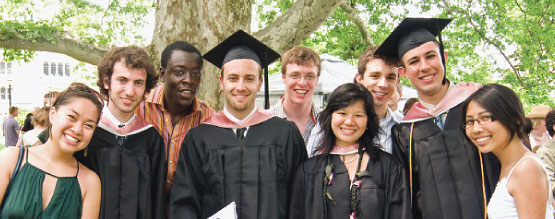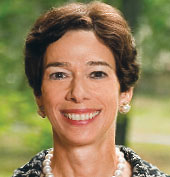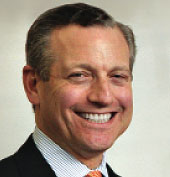An Eye to the Future
In the context of the financial crisis of 2008, Barbara Manfrey Vogelstein ’76 faced a task that would have been daunting even in the best of times, chairing a fundraising campaign for the college with an impressive $400 million goal.

Chair of both the Campaign Committee and the Board of Trustees’ Development Committee, Vogelstein reminded herself that Vassar has a long history of proceeding in difficult times. After all, Matthew Vassar staked out the ground for Main Building the day Fort Sumter fell. Once she agreed to lead the campaign, Vogelstein never looked back. “I so valued the education that I got from Vassar,” she says. “When I learned of the opportunity to raise significant amounts of money for the college, I thought, this is the ultimate way I could help.”
On January 18—exactly 150 years from the day the New York Legislature granted the charter to Vassar Female College—the college publicly announced its Vassar 150: World Changing fundraising campaign. The campaign is a nod to history and the present, but, most importantly, a way to help the college realize its future.
The three priorities of the Vassar 150: World Changing campaign are simple. One important goal is to ensure continuing access to the excellent resources the college provides for all qualified students. Following Matthew Vassar’s lead in opening the doors of higher learning to women, the Vassar 150: World Changing campaign underscores the college’s ongoing commitment to attract the best and brightest students from an ever more diverse population, no matter what their socioeconomic status. To this end, Vassar is raising funds for financial aid, as well as for library resources, community partnership programs, and a wide range of faculty support.
Vassar also will seek to build a new integrated science center to support the increasingly multidisciplinary nature of scientific study in our time. (Read the story.) In so doing, the college will bring its facilities for the sciences up to the same level it has achieved with its arts facilities.
Vassar’s Annual Fund, which provides crucial unrestricted support for Vassar’s operations, forms the third essential priority of the Vassar 150: World Changing campaign, sharing equal billing with the college’s access and science initiatives. It’s no wonder. Ninety percent of those who give to the college each year do so through the Annual Fund, making this group Vassar’s largest donor category. The total amount of contributions to Vassar’s Annual Fund over the course of the Vassar 150: World Changing campaign is projected to reach $70–80 million.

In honor of the Sesquicentennial, all four classes of current students (2011, 2012, 2013, and 2014) will unite this semester to raise funds for an All-College Gift to Vassar’s Annual Fund. The classes hope to persuade 1861 students to give—and if their efforts succeed, an anonymous group of alums has promised a match of, appropriately enough, $150,000. As an added incentive, Annual Fund donations may now specifically be directed to sustainability efforts at Vassar, thanks to advocacy from the Class of 2011.
“It’s not surprising that a college would launch a campaign in conjunction with its sesquicentennial year,” says Vogelstein. “What is remarkable is that $262 million already had been raised prior to our campaign’s public announcement.” She was also gratified to see that even in the middle of the financial crisis, Vassar had its second highest fundraising year ever.
“These results could never have been achieved without the extraordinary generosity of Vassar alumnae and alumni. And thanks to the extraordinary efforts of many alumnae/i volunteers, including the Campaign Steering Committee, its vice chairs Pat Parton Rosenwald ’56, Missie Rennie Taylor ’68, and Mark Ordan ’79, and the college’s superb Alumnae/i Affairs and Development team led by Cathy Baer,” Vogelstein states.
“We are all driven by the Board’s 2007 decision, at Cappy’s urging, to return to need-blind admissions,” says William A. Plapinger ’74, who has served as chair of the Board of Trustees since 2006 and as a trustee since 1996. Vassar makes its admissions decisions without considering a student’s financial resources and endeavors to meet all domestic students’ full demonstrated need for all four years of their Vassar education.
“The ability to provide financial aid is critical to the Board, to me as chair, and to Cappy as president. It is the fundamental mission of this institution, as reflected in the ever-increasing quality and diversity—economic and other—of the students we attract. Their education will have important benefits, of course, for the students themselves, but also their families, their communities and, I hope, for the world at large,” Plapinger says.
Currently more than 60 percent of Vassar’s students receive financial aid from the college, with over $50 million provided this academic year, amounting to more than a quarter of Vassar’s operating budget. “This level of aid certainly challenges the resources of the college. We rise to the challenge because access and diversity contribute immeasurably to the mission of the college and to the strength of our teaching and learning,” President Hill said recently.

Vogelstein agrees the results of a successful Vassar 150: World Changing campaign will be transformative for the college. “Vassar has always had a superb, state-of-the art curriculum in science, but our facilities have not kept pace with our teaching,” she notes. “By raising funds to secure a multidisciplinary science facility, we will put Vassar at a whole new level of excellence.”
Chairing the campaign has meant thousands of miles traveled, as well as conversations with alumnae/i all over the country and abroad. Vogelstein sees these as opportunities to listen as much as to speak: “Chairing the campaign has been nearly a full-time job. I’ve been at it since 2006, but I honestly can say that it has been a total pleasure. I get to meet interesting and accomplished Vassar alumnae and alumni, and my job is to put forth the case about the college and to try to get them as excited about it as I am. I absolutely love it, because finding ways to match their interests with the needs of the college is a very creative process.”
Vogelstein is based in New York; Plapinger, whose workload also has been greatly increased by the campaign, is based in London. When asked why he does it, Plapinger, a member (as he puts it) of the first fully coeducational class at the first college for women and the parent of a recent graduate, responds: “Vassar is simply a part of my identity.”
“Being involved with Vassar is one of the greatest pleasures I have,” he adds. “I have found over the years that the trustees, other volunteers, administration, students, and staff—everyone involved with the college—is very dedicated to it. When they raise questions, as is inevitably the way with Vassar people, those questions arise out of dedication to Vassar. It’s a wonderful group of people to work with towards the ambitious goals the college sets for itself, which I am confident we will meet.”
